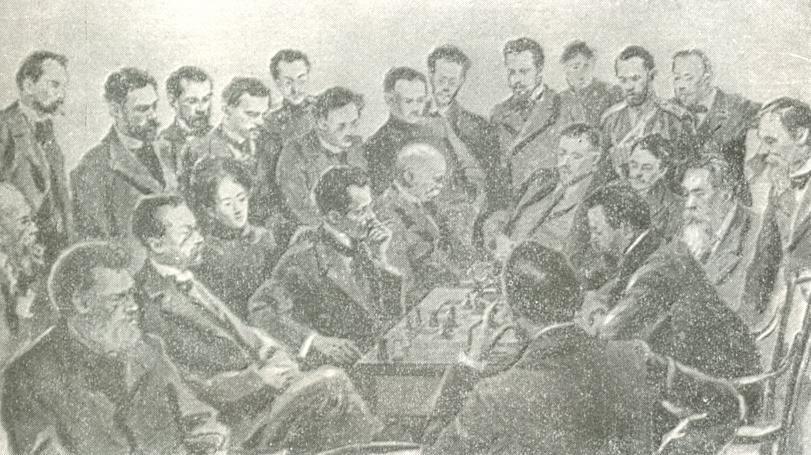
A Century of Chess: Hanover 1902
David Janowski, most mercurial of masters, started 1902 with a very impressive third place finish at Monte Carlo. During the course of the tournament, he squandered all his winnings at the casino. He had his third place prize reduced to a train ticket home to Paris (and presumably some kind of bailout from his casino losses). He was wiped off the board in a training match against Moritz Porges and a high-profile match with Carl Schlechter, and then, not missing a beat, took convincing first place at the very strong 18-player Hanover tournament, which may well have been the high-water mark of his long career.

He lost to his bête noire Mason but was otherwise dominant, posting a score of +10 and winning his last five games of the tournament. The game against Chigorin - included below - is a good example of his style, holding onto the initiative deep into the endgame.
Janowski needed every bit of energy to stay ahead of Harry PIllsbury, who lost two games right at the outset of the tournament, and then scored 11.5 out of 14 the rest of the way - and, during an off day, set a record by playing 21 simultaneous blindfold games against master-strength players. Pillsbury's tear gave him a chance to catch Janowski. He played their fifteenth round game trailing by only a half-point. That famous chess publication, The Honolulu Evening Bulletin, called it "the greatest game of modern chess," but that's putting it strongly. Pillsbury ceded Janowski the two bishops straight out of the opening and then, in an interesting strategic struggle, took his eye off the ball with 37.Nh3? allowing Janowski to crash through.
For the fifth time in six tournaments, Pillsbury finished second, which must be some kind of a record - and is reminiscent of Paul Keres' four second place finishes in Candidates Tournaments.
I've been thinking about when to introduce 'the class of 1900' and this seems like the right moment. All of them - Frank Marshall, Henry Atkins, William Napier, Rudolf Swiderski, Heinrich Wolf, Adolf Olland, Wilhelm Cohn - took part in this tournament.
It's a convenient rule-of-thumb way to think about chess history to break it down into groups of players coming-of-age at roughly five-year intervals. The class of 1895 - Pillsbury, Maróczy, Schlechter, Janowski, Charousek - defined classical chess for decades afterwards. The class of 1905 (the 'Barmen generation) - Rubinstein, Duras, Bernstein, Vidmar, Tartakower, Spielmann, Nimzowitsch, etc - went on to create hypermodernism and the edgy 'sturm und drang' style. On the other hand, the class of 1900 - with the great exception of Frank Marshall - left barely a trace on chess history. Very few of them were tempted to become chess professionals, and they drifted away to pursue careers in other fields. There's something a bit juvenile about their style - they had the rudiments of classical chess and were able to post decent results without digging particularly deep into the game - but all of them could be playful and original and had good tactical vision. Hanover was a good showcase for them - their play seemed much more nimble and dynamic than that of the old guard.
Atkins, maybe the strongest of the group (apart from Marshall), was also the most colorless, playing straightforward 'scientific' chess. He was known as 'the little Steinitz,' much as Isaac Kashdan decades later came to be "the little Capablanca." He was the strongest English player between Amos Burn and Fred Yates. He played very few international tournaments throughout his career and finished a strong third at Hanover, one of his best results.
Napier is one of my favorite players, a brilliant writer, charming, with a sparkling style, closely paralleling Pillsbury's career. He left chess for a career in insurance, rising to be a vice president. Had he continued playing, it's easy to imagine him as a similar player to Tartakower, hanging near the top level and lovingly remembered for his aphorisms and chess wit. At Hanover, he won the brilliancy prize for his game against Von Bardeleben and helped to ruin Pillsbury's tournament by defeating him in their individual game.

Swiderski would be described by Frank Marshall as the 'most weird of all the chess masters' he ever met. His style was really unique - I think of him as a progenitor of hypermodernism, a bridge between Amos Burn and Aron Nimzowitsch. He committed suicide in 1909.
Wolf is now best remembered for Akiba Rubinstein's put-down: "Against Wolf, I draw when I want to," but he was a tenacious opponent, with a sharp, skirmishing style. He was one of the very best in the world at the turn-of-the-century and put up good results into the 1920s.

Olland - the best Dutch player before Euwe - has left almost no impression on chess history, but he was a tough fighter with a logical, forthright style.
Wilhelm Cohn's overriding legacy is to have had probably the most extraordinary mustache in all of chess history. He was the weakest of this group, probably no more than a strong FM or IM in today's terms, but there is something light and dancerish in his play - he won his game against Pillsbury in this tournament.

Meanwhile, Marshall continued to struggle and seemed to be no more than a mid-level master, but, as he wrote, "I knew I was capable of good chess, in fact was producing it in individual games."
This is already too many games for one post, but what's a turn-of-the-century tournament without a tactical melée involving Jacques Mieses? Here's a swindle he pulls off against Frank Marshall.